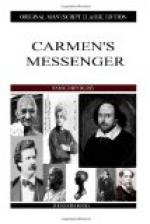Next morning he set off on foot, heading northeast into the hills. He walked leisurely, because he was going to Jedburgh, but had not made up his mind if he would get there that night, since Pete had told him of a farm where he could stop.
About four o’clock in the afternoon he stopped near the middle of a barren moorland and looked round. The road ran back into the strong yellow glow of the sunset, but it crossed a ridge about a mile off, and there was nobody in sight. It was very rough in places, but he thought a skillful driver could take a car over it. To the east, where the horizon was hazy, the high ground fell away, and he thought he could strike another road to Jedburgh in three or four miles if he crossed the heath. There seemed to be no reason why he should do so, but he left the road and some time later came to a burn that ran down hill.
By and by a rough track began in a marish field and got smoother as it followed the burn. Then a hedge of tall thorns, with wool-fringed gaps between their stems where the sheep went through, ran down the waterside, and Foster sat down on a stone and studied his map. He thought it would take him nearly two hours to reach Jedburgh, but the small farm Pete had spoken of was not far off. The track he was on seemed to lead to a better road in the valley. Mist was gathering in the hollow, but when he looked back the sky was bright and the yellow glow rested on the hill. The evening was very calm; he heard a curlew crying far off across the moor, and then raised his head sharply at a quick ringing sound. There was a wire fence up the hill, which he had got over because the rotten gate stuck fast. Somebody had stumbled in climbing it and his foot had struck the wire.
Foster’s eyes narrowed as he gazed up the track and saw two figures come round a corner. They were too far off to be distinct, but were walking fast. If he sat still, he would be invisible for two or three minutes but not longer, and he quickly studied his surroundings. There were large boulders and brambles between him and the water, and the tall hedge offered a hiding place on the other side. It might be wiser to get out of sight, but he would make an experiment, and dropped a few wax matches and a London newspaper he had bought in Carlisle. The country people did not use wax matches and London newspapers were not common among the Border moors.
Then, moving slowly, he made for the hedge. There were only a few bushes between him and the approaching men, but he had a good background, into which his figure would melt, and was ready to lie down if needful. He paused for a moment at the edge of the burn, which spread out in a shallow that reflected the fading light. He might be seen against the water, but something must be risked, and if the men were looking for him, they would watch the road. Stepping into the stream, he waded across, making as little splash as possible, and found a hole in the hedge, through which he crawled. He was now in the shadow and it would be difficult to distinguish him among the thick stems.




